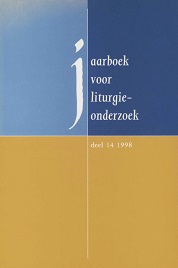Omkeren op de ingeslagen weg. Een heroverweging van het pastoraat van schuld en verzoening
Abstract
In this article a pastoral and a liturgical theologian discuss the possibility of renewing the pastoral and the liturgy of penance and reconciliation. The traditional rite of penance seems not to meet our (feelings of) guilt anymore. This is probably due to the fact that our feelings of and towards guilt have changed. Our guilt has not diminished, but seems to be modernized. The modern guilt is the feeling and fact that we have lost hold of our own self-controlled, self-conscious lifes. A renewed pastoral and liturgy of penance and reconciliation must adapt to this modern (feeling of) guilt. It must help us, autonomous people, to find reconciliation and forgiveness; it must help us, selfless selves, to find life. It is our belief, that the liturgy of penance and reconciliation could form a process in which many aspects of the human being can be met: autonomy and heteronomy, activity and receptivity, sacramentality and therapy, individuality and communality. In the pastoral quest for reconciliation we have to adopt a course with several stages. It begins with a sudden feeling that there is something wrong (the assault). This feeling causes us to investigate what is wrong with us (self-investigation). When we have found the ‘sin’, we are in the position for being healed (healing). Finally, after having healed the wound, we can try again to live our life as it is to be lived (reconciliation). We think that it would be good, when we would go the course of guilt together with a small and intimate group. A liturgical quest for reconciliation has to guide us in our going the course of guilt. This liturgy should therefore be a trajectory with several stages and turning points. Realizing that the confession is a kind of ‘second baptism’, and that reconciliation is a kind of ‘reinitiation’, we decided in our design of a liturgy of reconciliation to lean heavily of the liturgy of the catechumenate. This liturgy of reconciliation could therefore be called a ‘penitentiate’ or ‘reconciliate’. The four periods of the ‘penitentiate’ correspond to the stages in the course of guilt (the assault, self-investigation, healing and reconciliation); the transitional steps between these periods are moments of celebrations which can all be taken from the Ordo initiationis christianae adultorum of 1974.


